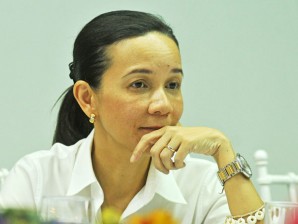Grace Poe spent P6.07 for each vote she got
MANILA, Philippines—Senator-elect Mary Grace Poe Llamanzares, the topnotcher in the 2013 senatorial race, spent P123 million in her campaign, spending about P6.07 for each of the 20,337,327 million votes that she received.
Fifth-placer Nancy Binay, who declared expenses of P128,695,057.10 for the 16,812,148 votes that she received, spent an average of P7.65 per voter.
These election-spending trivia are contained in the statements of election contributions and expenditures that candidates and parties that contested the May 13 elections have submitted to the Commission on Elections (Comelec).
The poll body said that 29 group and individual candidates have so far filed their statements of election contributions and expenditures. Thursday is the deadline for the filing of such documents.
In the statement of expenses and expenditures that she submitted to the Comelec on Wednesday, Llamanzares declared that she received P123,605,341.27 in contributions. Her mother, Susan Roces, or Jesusa S. Poe in real life, contributed P17,390,271.71, she said.
Article continues after this advertisementBam’s report
Article continues after this advertisementBesides Llamanzares, the other incoming senators who have submitted their expense reports are Bam Aquino, who received P125,493,000 in contributions while spending P124,327,987.81, and Binay, who said she got P136,869,398.78 in contributions and spent P128,695,057.10.
Aquino’s father, Paul, contributed P10.2 million while his uncle, former Sen. Agapito “Butz” Aquino, gave P10 million to his campaign.
“This is under oath so if they don’t give a correct statement, they can be charged with perjury. It would also be an election offense,” said Esmeralda Ladra, director of the Comelec law department.
The Comelec requires candidates to submit expense and contribution reports to find out if they had overspent in the last elections.
Election rules allow candidates for president and vice president to spend P10 for each voter. Candidates with political parties can spend P3 while independent candidates can spend up to P5 for each voter.
Penalties for offenders
Ladra said those found to have overspent could be charged with an election offense, which could lead to the offender losing his right to vote and perpetual disqualification from holding public office.
“We will start here to determine if there was overspending or not, or if there were omissions in their statements,” she added.
Comelec lawyer John Rex Laudiangco said the other individual candidates who have filed their expense and contribution reports were senatorial candidates Ramon Montano and Christian Seneres and the party-list groups A Amover, Ang Nars, AKO, 1-Aalalay, Ang Mata’y Alagaan, Unimad, Aba, Yacap, Partido Demokratiko-Sosyalistang Pilipinas, Anac-IP, Anakpawis, Butil Farmer, 1-Bap, Bantay, Abono, Angkla, 1-Sagip, Cocofed, Agbiag Timpuyog Ilocano Inc., Aasenso, 1-Abilidad, Senior Citizens, Aangat Tayo and Agham.
Comelec Commissioner Christian Robert Lim earlier said that Congress should place a limit on election contributions after the poll body noticed that many candidates “suddenly withdraw” in the month of January in an election year, or only a few months after filing for candidacy.
“Either [they ran to] raise money or to be bought out by another candidate,” Lim said.
Contribution limit
“One of the things we want is for [a law which says a] candidate cannot accept more than he is allowed to spend. If his [expenditure] limit is P153 million, then you should not accept more than P153 million,” he said.
“Because if there’s a leeway, they turn it into a money-making [scheme]. It also encourages the candidate to exceed [their spending] and then underdeclare this in his or her Sece,” he added.
Lim said the Comelec will be submitting to the Office of the Ombudsman and the Bureau of Internal Revenue (BIR) data on the candidates’ expenditures and contributions.
The BIR and the Ombudsman should thoroughly review the contributions that politicians receive, especially if they are incumbent officials, he said.
“For example, if you are an incumbent official and you just receive and receive, isn’t that bribery?” Lim said.
“At the same time, didn’t the BIR declare that the funds a candidate did not spend should be subject to tax?” he added.
